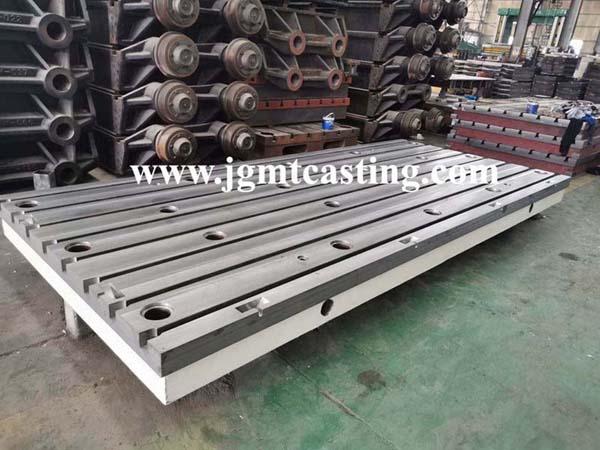Cast iron bed plate production process
1. Make a model according to the cast iron bed plate drawing approved by the purchaser, and prepare the casting tooling (sand box, core iron), etc.
2. Cast iron plate modeling in the foundry workshop.
3. After the cast iron platform is finished, it is ready for casting.
4. Pre-furnace test of cast iron bed plate: The raw materials enter the factory, and the pig iron manufacturer requires a test report. Our factory will conduct a test on the pig iron according to the test report to see if it meets the requirements.
5. Post-furnace test of cast iron bed plate: After the molten iron is melted, test whether it meets the requirements. If some of the elements are unqualified, it can be increased or decreased until it is qualified.
6. Coke test: Whether sulfur and phosphorus are qualified.
7. After the cast iron bed plate castings are cast, inspect whether the casting blanks are qualified.
8. After the cast iron platform castings are qualified, heat treatment is carried out. The heat treatment is to increase the temperature by 30°C per hour and reach a constant temperature of 860°C for 4 hours, and then lower the temperature by 30°C per hour.
9. After the cast iron flat plate heat treatment, use a planer to roughen 4 sides, and use side milling to machine both ends, the roughness reaches 12.5, after the rough machining, check whether there are casting defects such as sand holes, pores, etc., if there are large casting defects , Castings are scrapped and recast again, if the inspection is qualified, then the artificial aging will be carried out, and the artificial aging will reach 550℃.
10. After the heat treatment of the cast iron plate, use CNC milling for rough machining. After finishing according to experience, CNC machine the surface of the plate, and then manually scrape or grind it to meet the requirements of the drawing. After the inspection is qualified, the appearance will be painted again. It should be packed and ready for shipment.
2. Cast iron plate modeling in the foundry workshop.
3. After the cast iron platform is finished, it is ready for casting.
4. Pre-furnace test of cast iron bed plate: The raw materials enter the factory, and the pig iron manufacturer requires a test report. Our factory will conduct a test on the pig iron according to the test report to see if it meets the requirements.
5. Post-furnace test of cast iron bed plate: After the molten iron is melted, test whether it meets the requirements. If some of the elements are unqualified, it can be increased or decreased until it is qualified.
6. Coke test: Whether sulfur and phosphorus are qualified.
7. After the cast iron bed plate castings are cast, inspect whether the casting blanks are qualified.
8. After the cast iron platform castings are qualified, heat treatment is carried out. The heat treatment is to increase the temperature by 30°C per hour and reach a constant temperature of 860°C for 4 hours, and then lower the temperature by 30°C per hour.
9. After the cast iron flat plate heat treatment, use a planer to roughen 4 sides, and use side milling to machine both ends, the roughness reaches 12.5, after the rough machining, check whether there are casting defects such as sand holes, pores, etc., if there are large casting defects , Castings are scrapped and recast again, if the inspection is qualified, then the artificial aging will be carried out, and the artificial aging will reach 550℃.
10. After the heat treatment of the cast iron plate, use CNC milling for rough machining. After finishing according to experience, CNC machine the surface of the plate, and then manually scrape or grind it to meet the requirements of the drawing. After the inspection is qualified, the appearance will be painted again. It should be packed and ready for shipment.
